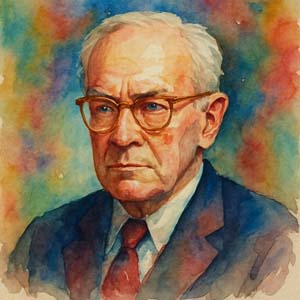
A passionate leader in the treatment and prevention of mental illness, Karl Augustus Menninger (1893–1990) was born on this day. In 1925, his family established one of the world’s most renowned psychiatric clinics in Topeka, Kansas, a bold legacy of healing and hope.
“Set up as an ideal the facing of reality as honestly and as cheerfully as possible,” he once advised.
Often called the dean of American psychiatry, Menninger believed deeply in the power of love. “Love is a medicine for the sickness of the world,” he said. “A prescription often given, too rarely taken.”
In 1946, the Menninger School of Psychiatry became the nation’s largest training center, created to help veterans returning from World War II. He also raised his voice for world peace and nuclear disarmament.
“Hope is an adventure, a going forward, a confident search for a rewarding life,” he said.
A visionary with a compassionate heart, Menninger stood up for the disadvantaged—supporting American Indians, neglected children, the mentally ill, and those in prison.
He believed a lack of parental love was often at the heart of destructive behavior. Crime, he said, was a by-product of mental or emotional illness.
“Love cures. It cures those who give it and it cures those who receive it,” he proclaimed.
A best-selling author, his landmark books—The Human Mind (1930) and Man Against Himself (1938)—encouraged individual respect and understanding, and introduced many to psychiatry.
“Man can’t help hoping even if he is a scientist. He can only hope more accurately,” he noted.
Menninger believed in the power of love to heal. He was a doctor of the mind, but also of the heart. For his legacy, he was awarded the Presidential Medal of Freedom in 1981.

 A positive
A positive